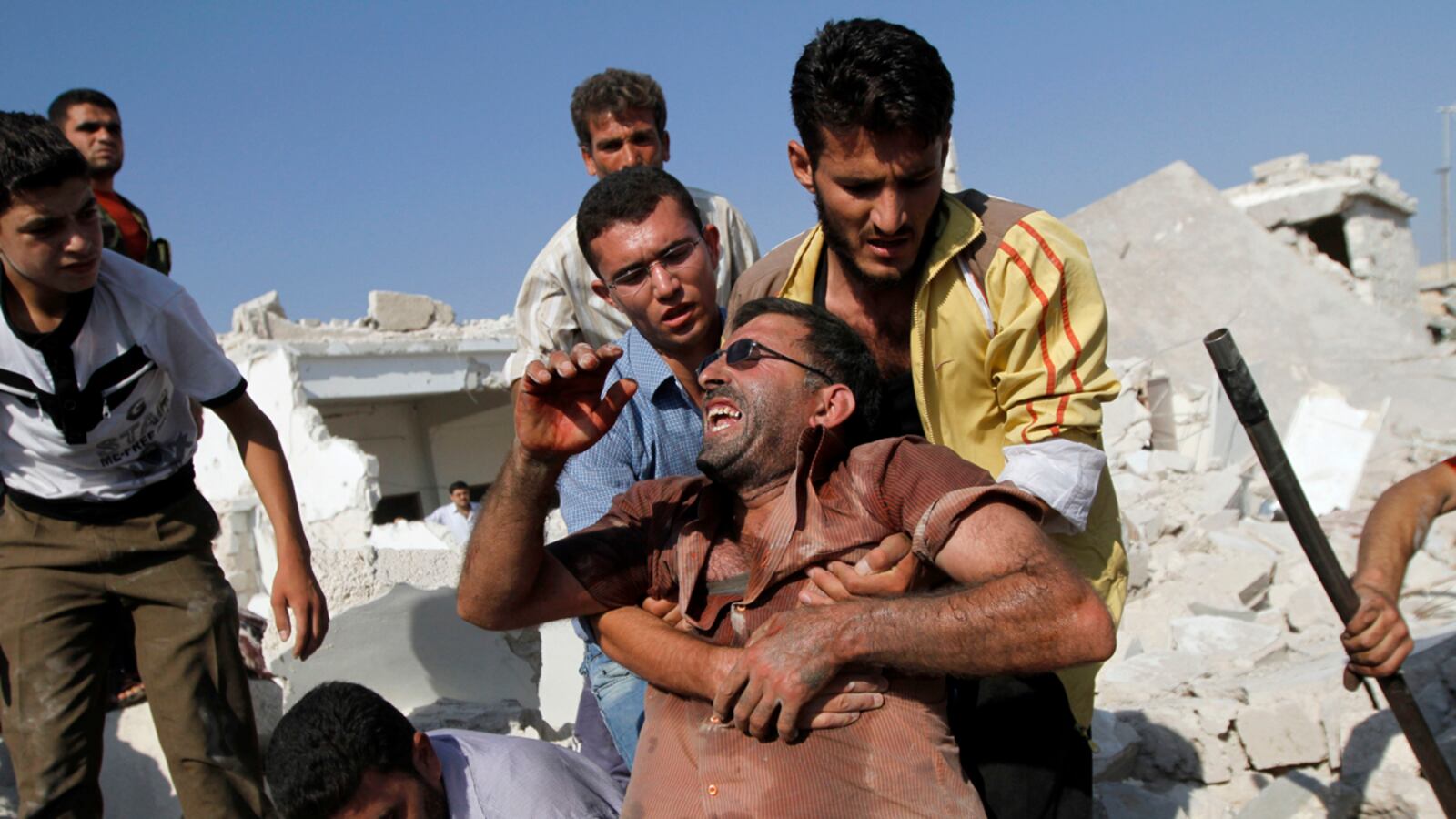There's an urgent, somewhat desperate chorus of prominent voices—longtime advocates for reason and humanity in international affairs—who are calling on the United States and its Western allies to intervene in Syria directly and militarily. But despite their best intentions, their propositions sound a lot like the thankless adventures that Rudyard Kipling called "the savage wars of peace."

Anyone looking at images of the carnage coming out of Syria these days sympathizes with the desire to see the bloodletting end. Nobody in the West or in Israel wants to see the conflict spread, and, as the mass kidnapping in Lebanon of 20 Syrians on Wednesday suggested, there is every reason to fear that it will. So while it is worth listening to those who say they know how the Assad regime can be toppled more quickly, efficiently, and humanely than seems to be the case at present, it's also worth understanding why almost nothing that these people recommend will be done—and why what is being done, mostly in secret, is attracting so little praise.
In The New York Times, noted columnist Nicholas Kristof recently came out in favor of limited American military intervention against the Damascus regime of Bashar al-Assad. In a column headlined "Obama AWOL in Syria," Kristof (who opposed the Iraq invasion in 2003) quoted two Clinton administration officials, former Defense secretary William Perry and former secretary of State Madeleine Albright. Perry suggested a no-fly, no-drive zone. Albright said she favored intervention and more involvement, but "not on the ground." Yet when Perry and Albright were in office, the Clinton administration's own intervention record was decidedly mixed. The invasion of chaotic, enfeebled Haiti was a short-term success. The 1999 war that eventually won Kosovo its independence from Serbia (over Russian objections and outside the U.N. framework) was a model combination of Western air power and guerrilla warfare by the locals. But in Rwanda, hundreds of thousands of people were butchered on Perry and Albright's watch, and the United States never intervened. Somalia was abandoned. The Bosnian war had gone on for three years before the U.S. finally helped tip the scale against the Serbs. In Iraq, Saddam Hussein's brutal regime managed to hold on to power despite repeated bombings and U.S.-backed coup plots—and more than a decade of no-fly zones in both the north and south of his country.
Responsible governments do what they can do in such circumstances, but their options are limited by realities that officials-turned-pundits and other opinion-makers don't have to face. The Libyan intervention was do-able because the military challenges were minimal: most of the war was fought along a single highway close to the sea against an ill-organized collection of troops and mercenaries with minimal air defenses. Even then, it took months to bring Col. Muammar Gaddafi down.
The Obama administration and other Western governments trying to deal with the Syrian crisis are moving cautiously for very good reasons. To cite just a few: There is the well-justified weariness of the American public and NATO when it comes to military adventures in the Muslim world. Even if this weren’t an election year in the United States, that fact would weigh heavily against a major new intervention.
Even if the conflict is already spilling over into neighboring countries, there’s understandable concern that the stain on the map may spread further and more rapidly, if the Syrian regime—or its Iranian supporters—starts retaliating against those who back the rebels in weak Lebanon, Jordan, and Iraq. At a time when Israel's leadership is making increasingly aggressive noises about attacking Iran before the end of October, an action almost certain to suck Americans into a wider conflict, Washington could quickly find itself spread over a Middle East battlefield with several fronts.
Beyond that, Syria is not a one-road war. Aleppo is not Benghazi. The terrain is complex and the cities are densely populated. Add to that the complexity of the Syrian social and religious "mosaic," as it's often called. (Are we ready to back rebels dominated by Sunni Muslim zealots who might then turn on Syria's Christians who, for years, have felt protected by the Assad regime?) And then there is the incoherence of the rebel leadership. Who are we talking about? Who are we talking with? As one Syrian activist told Mike Giglio of The Daily Beast this week, “Now, we have one enemy in Syria. After the regime falls we will all be enemies.”
Those arguing for military intervention say the longer the United States holds back, the less influence Washington will have with the rebels. But even if American troops could safely land a whole new president and parliament in Damascus, that's no guarantee the replacement regime will be grateful. Debts of thanks are almost never bankable and often make for resentments. Think of Washington's problematic experience with the governments it installed in Kabul and Baghdad.
Former CIA analyst and National Security Council staffer Kenneth Pollack, who argued the case for invading Iraq in 2002, is a whole lot more cautious about interventions these days. Pollack, now at Brookings, writes in a recent essay that there are only a couple of ways a civil war like the one in Syria can end: "One side wins, typically in murderous fashion, or a third party intervenes with enough force to snuff out the fighting. Until Washington commits to either helping one side or leading an intervention in Syria, nothing else we do will make much difference."
But Pollack does not actually recommend a full-scale action like the one he called for in Iraq a decade ago, or even the one in Libya. Instead, he suggests something that the Obama administration might actually be doing already.
Given that the U.S. has clearly picked sides and wants Assad removed, Pollack advocates supplying the rebels with effective antitank and antiaircraft weapons. But there is no reason that these have to come from the United States—and the crash of a Syrian government jet this week suggests that some effective antiaircraft weapons may already be in rebel hands.
More important is the role the United States may play in training and organizing the rebel military. That is the kind of thing the United States Army's Special Forces (the Green Berets) were created to do, and have done for half a century. And that sort of action seems to be well within the scope of the intelligence "finding" recently signed by President Barack Obama authorizing "non-lethal" support for the rebels. "One of the best ways for the United States to influence a post-civil-war political process is to maximize its role in building the military that wins the war," says Pollack.
What Pollack does not say explicitly, but other intelligence officials involved with past conflicts in the Balkans and the Middle East remember, is that it's hard to end a civil war even with an intervention unless both sides are exhausted by the carnage. That took 15 years in Lebanon; three horrible years in Bosnia. Such are the savage wars of peace.





